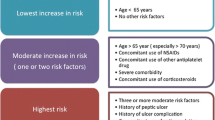Abstract
Low-dose aspirin is increasingly used for the primary prevention of cardiovascular events. However, current evidence suggests that the gastrointestinal and other bleeding risks of aspirin probably outweigh its potential benefits in primary prevention. Various strategies have been proposed to reduce the gastrointestinal risk of aspirin, including gastroprotection with a proton pump inhibitor (PPI), eradication of Helicobacter pylori infection and replacing aspirin with other anti-platelet agents. Although co-therapy with a PPI and the eradication of H. pylori substantially reduce the risk of recurrent ulcer bleeding with aspirin, the replacement of aspirin by clopidogrel cannot be recommended to patients with a high gastrointestinal risk. Traditionally, strategies for the prevention of non-steroidal anti-inflammatory drug (NSAID)-induced ulcer complications included co-therapy with a gastroprotective agent and the substitution of cyclooxygenase (COX)-2 inhibitors for non-selective NSAID. Evidence emerged recently that COX-2 inhibitors and some non-selective NSAID increase cardiovascular risk. Before prescribing anti-inflammatory therapy, both gastrointestinal and cardiovascular risk factors of individual patients need to be evaluated. In patients with increased cardiovascular risk requiring anti-inflammatory analgesics, the combination of a non-selective NSAID, low-dose aspirin and a PPI is the preferred treatment.
Similar content being viewed by others
References
Weisman SM, Graham DY. Evaluation of the benefits and risks of low-dose aspirin in the secondary prevention of cardiovascular and cerebrovascular events. Arch Intern Med 2002; 162: 2197–202
Derry S, Loke YK. Risk of gastrointestinal haemorrhage with long term use of aspirin: meta-analysis. BMJ 2000; 321: 1183–7
Pearson TA, Blair SN, Daniels SR, et al. AHA Guidelines for primary prevention of cardiovascular disease and stroke, 2002 update. Consensus panel guide to comprehensive risk reduction for adult patients without coronary or other atherosclerotic vascular diseases. American Heart Association Science Advisory and Coordinating Committee. Circulation 2002; 106: 388–91
Sanmuganathan PS, Ghahramani P, Jackson PR, et al. Aspirin for primary prevention of coronary heart disease: safety and absolute benefit related to coronary risk derived from meta-analysis of randomised trials. Heart 2001; 85: 265–71
Hayden M, Pignone M, Phillips C, et al. Aspirin for the primary prevention of cardiovascular events: a summary of the evidence for the U.S. Preventive Services Task Force. Ann Intern Med 2002; 136: 161–72
Hart RG, Halperin JL, McBride R, et al. Aspirin for the primary prevention of stroke and other major vascular events: meta-analysis and hypotheses. Arch Neurol 2000; 57: 326–32
Augustovski FA, Cantor SB, Thach CT, et al. Aspirin for primary prevention of cardiovascular events. J Gen Intern Med 1998; 13: 824–35
Chan FK, Chung SC, Suen BY, et al. Preventing recurrent upper gastrointestinal bleeding in patients with Helicobacter pylori infection who are taking low-dose aspirin or naproxen. N Engl J Med 2001; 344: 967–73
Lanas A, Bajador E, Serrano P, et al. Nitrovasodilators, low-dose aspirin, other nonsteroidal antiinflammatory drugs, and the risk of upper gastrointestinal bleeding. N Engl J Med 2000; 343: 834–9
Lai KC, Lam SK, Chu KM, et al. Lansoprazole for the prevention of recurrences of ulcer complications from long-term low-dose aspirin use. N Engl J Med 2002; 346: 2033–8
Chan FKL, Ching JYL, Suen CBY, et al. Eradication of H. pylori for the prevention of recurrent ulcer bleeding in high-risk aspirin users: a 4-year prospective cohort study [Abstract]. Gastroenterology 2005; 128 suppl: A133
Braunwald E, Antman EM, Beasley JW, et al. ACC/AHA 2002 guideline update for the management of patients with unstable angina and non-ST-segment elevation myocardial infarction — summary article: a report of the American College of Cardiology/American Heart Association Task Force on Practice Guidelines (Committee on the Management of Patients With Unstable Angina). J Am Coll Cardiol 2002; 40: 1366–74
Braunwald E, Antman EM, Beasley JW, et al. ACC/AHA guideline update for the management of patients with unstable angina and non-ST-segment elevation myocardial infarction: a report of the American College of Cardiology/American Heart Association Task Force on Practice Guidelines (Committee on the Management of Patients With Unstable Angina) 2002. Available from: http://www.acc.org/clinical/guidelines/unstable/incorporated/index.htm. Cited: 4 October 2005.
CAPRIE Steering Committee. A randomised, blinded, trial of clopidogrel versus aspirin in patients at risk of ischaemic events (CAPRIE). Lancet 1996; 348: 1329–1339.
Chan FK, Ching JY, Hung LC, et al. Clopidogrel versus aspirin and esomeprazole to prevent recurrent ulcer bleeding. N Engl J Med 2005; 352: 238–44
Weil J, Colin-Jones D, Langman M, et al. Prophylactic aspirin and risk of peptic ulcer bleeding. BMJ 1995; 310: 827–30
Goldstein JL, Joseph-Ridge N, MacDonald PA, et al. Lansoprazole provides gastroprotection in high-risk arthritis patients taking daily aspirin and chronic NSAIDS [Abstract]. Pharmacotherapy 2003; 23: 71E
Silverstein FE, Faich G, Goldstein JL, et al. Gastrointestinal toxicity with celecoxib vs nonsteroidal anti-inflammatory drugs for osteoarthritis and rheumatoid arthritis: the CLASS study: a randomized controlled trial. Celecoxib Long-term Arthritis Safety Study. JAMA 2000; 284: 1247–55
Levesque LE, Brophy JM, Zhang B. The risk for myocardial infarction with cyclooxygenase-2 inhibitors: a population study of elderly adults. Ann Intern Med 2005; 142: 481–9
Chan FK, Hung LC, Suen BY, et al. Celecoxib versus diclofenac plus omeprazole in high-risk arthritis patients: results of a randomized double-blind trial. Gastroenterology 2004; 127: 1038–43
Chan FK, Hung LC, Suen BY, et al. Celecoxib versus diclofenac and omeprazole in reducing the risk of recurrent ulcer bleeding in patients with arthritis. N Engl J Med 2002; 347: 2104–10
Scheiman JM, Vakil N, Hawkey CJ, et al. Esomeprazole prevents gastric and duodenal ulcers in at-risk patients on continuous non-selective or COX-2-selective NSAID therapy [Abstract]. Gastroenterology 2004; 126 suppl. 1: A–82
Author information
Authors and Affiliations
Corresponding author
Additional information
Dr Francis Chan is a member of the Data Safety and Monitoring Board of the EDGE I/EDGE II/MEDAL trials sponsored by Merck, and is a member of the steering committee of the CONDOR trial sponsored by Pfizer Inc.
Rights and permissions
About this article
Cite this article
Chan, F.K.L. Management of High-risk Patients on Non-steroidal Anti-inflammatory Drugs or Aspirin. Drugs 66 (Suppl 1), 23–28 (2006). https://doi.org/10.2165/00003495-200666001-00005
Published:
Issue Date:
DOI: https://doi.org/10.2165/00003495-200666001-00005




